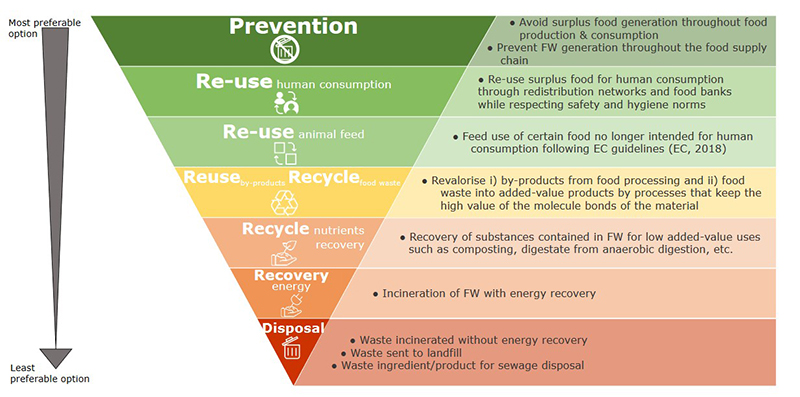In order to ensure that national efforts against food waste are informed by a solid evidence base and support sharing of innovation and best practice, the EU has been working on augmenting and improving the quantification of food waste levels. The revised Waste Framework Directive adopted on 30 May 2018 requires Member States to reduce food waste at each stage of the food supply chain, monitor food waste levels and report back regarding progress made. Moreover, it lays down obligations for Member States to:
- prepare food waste prevention programmes (specific and/or as a part of general waste prevention programmes);
- encourage food donation and other redistribution for human consumption, prioritising human use over animal feed and the reprocessing into non-food products as part of measures taken to prevent waste generation;
- provide incentives for the application of the waste hierarchy, such as facilitation of food donation (articles 4 and 9 of the revised Waste Framework Directive).

Practical application of the waste hierarchy for food
Source: Brief on food waste in the European Union,
European Commission Joint Research Centre, 2020
The Act also:
- introduces a ‘food waste’ definition based on the definition of food from the General Food Law;
- requests the Commission to adopt legislation on food waste measurement by end-March 2019;
- requests the Commission to prepare a report accompanied, if appropriate, by a proposal by end-2023 to set up an EU-wide food waste reduction target (to be met in 2030);
- states that consumer understanding of ‘use-by’ and ‘best before’ dates should be improved in order to reduce food waste.
The Commission has been delegated to establish a common methodology to measure food waste levels in the EU, as well as a reporting format for the EU countries to inform on progress made over time. The Member States Expert group supported the Commission in preparation of the related Delegated Act that lays down the common measurement methodology and its minimum quality requirements.
The Delegated Decision establishing a common EU methodology to measure food waste was published in the Official Journal on 27 September 2019 and entered into force on 17 October 2019. The first data collection on food waste was undertaken by Member States in 2020, in view of reporting on national food waste levels by mid-2022. The EU reporting framework helps standardize reporting of food waste levels by business and contribute to global monitoring of the Sustainable Development Goal Target (12.3).
Member States data collected according to the common EU food waste measurement methodology is reported to the EU by using a specific reporting format. Each set of data is accompanied by a quality check report, in order to help verify the quality of the data and improve data collection in the future. The Commission Implementing Decision laying down a format and quality check report for reporting the data on the levels of food waste generated in Member States, in accordance with Directive 2008/98/EC of the European Parliament and of the Council, was adopted on 28 November 2019. The legislative act completes the implementation of all the proposed actions and related legislative proposals on food waste foreseen in the EU action plan for the Circular Economy (2015).
The Commission organises webinars to support Member States in their legal obligations as regards measurement and reporting on national food waste levels. The webinars, primarily addressed to Member State experts, focus on concrete examples of national food waste monitoring.
9 July 2021
- Agenda
- Summary
- Recording
- Presentation - Food waste generation in Germany in 2015 and further procedure to meet the EU legal requirements for monitoring and reporting, part 1 – Thünen Institute
- Presentation - Food waste generation in Germany in 2015 and further procedure to meet the EU legal requirements for monitoring and reporting, part 2 – Federal Ministry for the Environment, Nature Conservation and Nuclear Safety
- Presentation - Experiences from 10 years with food waste monitoring in the Nordic region - results from a Nordic project - NORSUS Norway & RISE Sweden
- Presentation - Food waste measurement - Update from the Commission
25 November 2020
- Agenda
- Summary
- Recording
- Presentation - Monitoring and preventing food waste at the Finnish food chain - Natural Resources Institute Finland (Luke)
- Presentation - Food waste data studies in Ireland - Irish Environmental Protection Agency
- Presentation - Quantification of food waste in EU Member States using material flow analysis - Joint Research Centre
- Presentation - Food waste measurement - Update from the Commission
26 June 2020
- Agenda
- Summary
- Recording
- Presentation - Mapping of food waste in municipal pre-schools, schools and elderly homes in Sweden 2019 - Government commission on reducing food waste in Sweden
- Presentation - Food Waste in the Swedish Grocery Retail Sector - Statistics Sweden
- Presentation - Dutch national Monitor on Food Waste, progress towards measurement in different stages of food supply chain - Wageningen Food and Biobased Research
- Presentation - Food waste measurement - Update from the Commission
